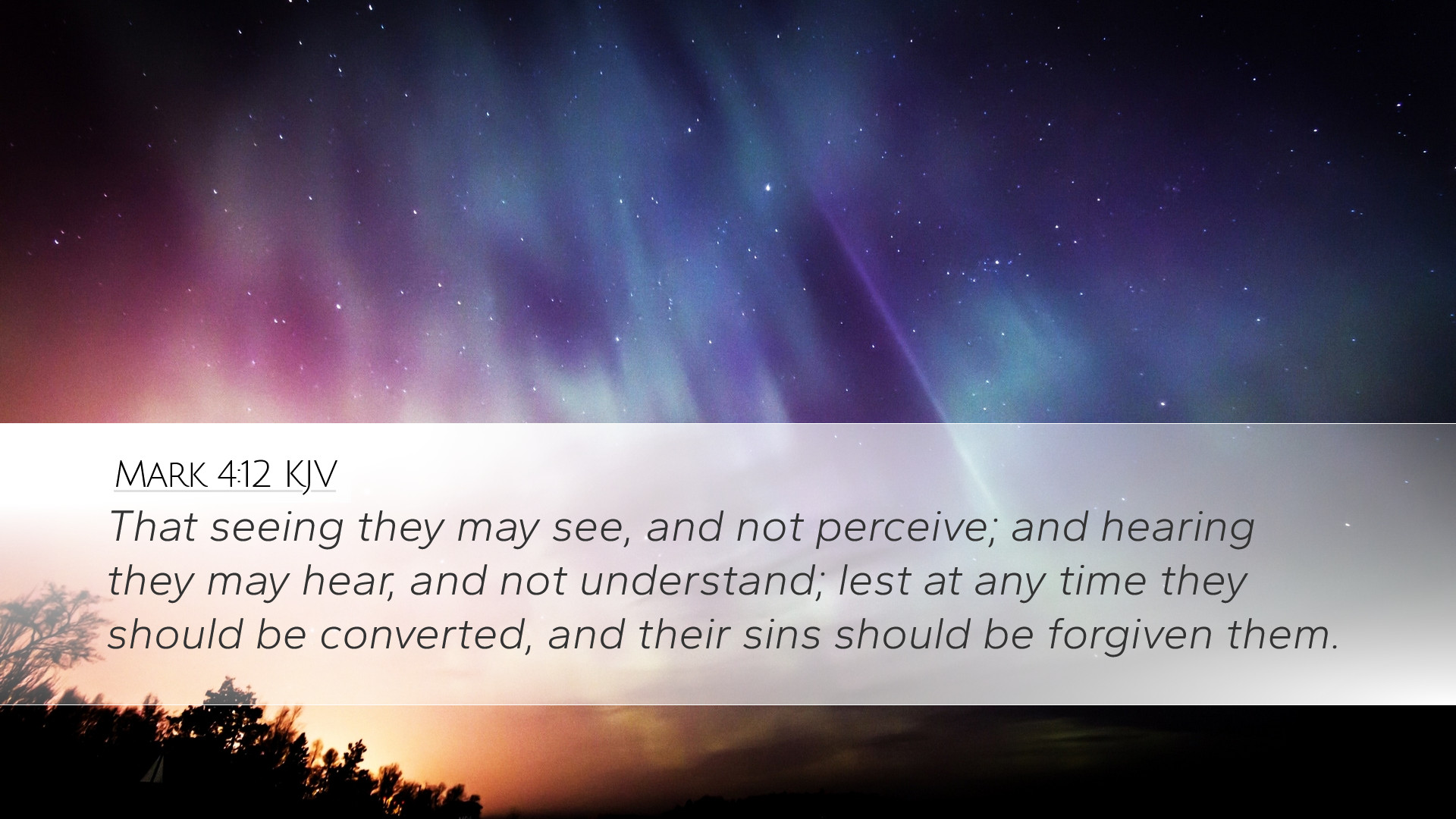Commentary on Mark 4:12
Bible Verse: Mark 4:12 - "So that seeing they may see and not perceive, and hearing they may hear and not understand; lest they should turn, and their sins be forgiven them."
Introduction
This verse is part of a larger discourse by Jesus on the purpose of parables as a teaching method. It reveals profound insights about the spiritual condition of the listeners and the nature of divine revelation. This commentary synthesizes insights from various public domain sources, focusing on the theological implications and practical applications for today's readers.
Interpretation of the Text
In this verse, Jesus quotes Isaiah as He explains why He speaks in parables. The repeated emphasis on seeing and hearing without understanding indicates a profound spiritual blindness and deafness, which reflects the state of many individuals who hear the message of the Kingdom yet fail to grasp its meaning.
Matthew Henry's Commentary
Matthew Henry suggests that this verse highlights God's sovereign choice in revealing or concealing the truth. The inability to perceive spiritual truths stems from a heart hardened by sin. Henry explains that the mercy of God is displayed in granting understanding to some while withholding it from others, as a display of His justice. He states:
"The words of this verse serve as a serious warning against the dangers of a hardened heart, which leads to a state where one cannot turn and be healed."
Albert Barnes' Notes
Albert Barnes emphasizes the reality that the parables serve a dual purpose: to reveal truth to the humble and sincere, while simultaneously concealing it from those who are indifferent or resistant. Barnes explores the consequences of hearing without understanding, indicating that such a state denies individuals the opportunity for repentance and forgiveness.
He writes:
"This is the just punishment of willful blindness, that those who choose not to listen should be left in their ignorance. They see the light, yet their eyes are closed to its meaning."
Adam Clarke's Commentary
Adam Clarke provides a detailed analysis of the original language and context. He notes that the phrase "lest they should turn" indicates a prevention not imposed by God, but rather a result of their own choices. Clarke also highlights the significance of "their sins be forgiven them" as it indicates the mercy that is available to those who, when they do understand, are able to repent.
Clarke observes:
"This speaks of a judicial act, where the individual has become so entrenched in their disbelief that they are allowed, as it were, to remain in that state."
Theological Implications
This verse raises important theological questions regarding predestination, human free will, and the nature of God's revelation.
- Divine Sovereignty: The selection of who understands and who does not underscores the sovereignty of God in salvation. It suggests a mystery in how God interacts with humanity.
- Human Responsibility: While God is sovereign, individuals still bear the responsibility for their spiritual state. The hardness of one's heart is a voluntary condition that results from repeatedly rejecting the truth.
- Grace and Judgment: The capacity to repent and receive forgiveness is a gift of grace, yet here, Jesus indicates that intentional rejection leads to judgment.
Practical Applications
For pastors, students, and scholars, Mark 4:12 serves as a vital reminder of the importance of cultivating an open heart towards the teachings of Christ. It urges believers to:
- Seek Understanding: Engage with Scripture prayerfully, asking for revelation and for God's Spirit to illuminate truths.
- Beware of Hardness: Regular self-examination is necessary to ensure that one does not become indifferent or spiritually apathetic.
- Embrace Humility: The understanding of God’s mysteries often comes to those who approach Him with a humble heart, willing to learn and grow.
Conclusion
Mark 4:12 is an essential text that contributes to our understanding of Jesus' teaching methods and the nature of revelation. By combining insights from Matthew Henry, Albert Barnes, and Adam Clarke, we see the dual themes of divine justice and mercy, as well as the profound implications for human responsibility. As we reflect on this verse, may it inspire a deeper love for God’s Word and a desire to truly understand and live out its truths.


